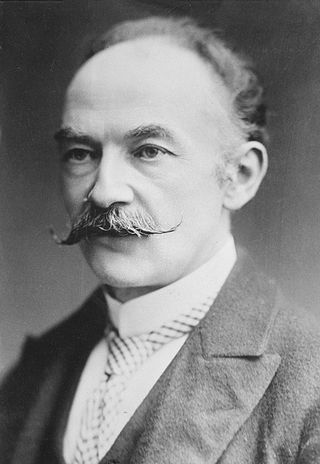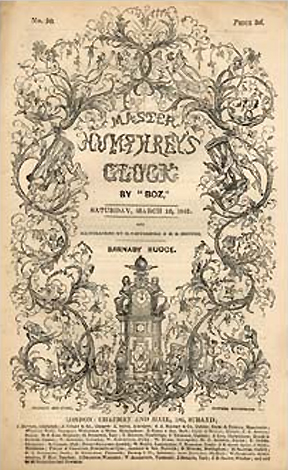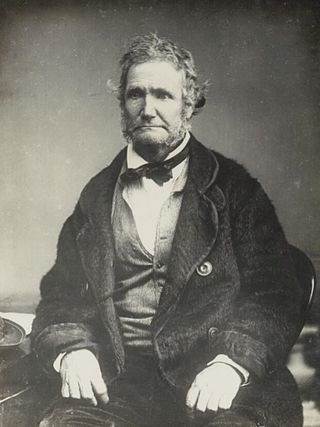
Thomas Hardy was an English novelist and poet. A Victorian realist in the tradition of George Eliot, he was influenced both in his novels and in his poetry by Romanticism, including the poetry of William Wordsworth. He was highly critical of much in Victorian society, especially on the declining status of rural people in Britain such as those from his native South West England.

Far from the Madding Crowd (1874) is Thomas Hardy's fourth published novel and his first major literary success. It was published on 23 November 1874. It originally appeared anonymously as a monthly serial in Cornhill Magazine, where it gained a wide readership.

The Mayor of Casterbridge: The Life and Death of a Man of Character is an 1886 novel by the English author Thomas Hardy. One of Hardy's Wessex novels, it is set in a fictional rural England with Casterbridge standing in for Dorchester in Dorset where the author spent his youth. It was first published as a weekly serialisation from January 1886.

Melmoth the Wanderer is an 1820 Gothic novel by Irish playwright, novelist and clergyman Charles Maturin. The novel's titular character is a scholar who sold his soul to the devil in exchange for 150 extra years of life, and searches the world for someone who will take over the pact for him, in a manner reminiscent of the Wandering Jew.

Barnaby Rudge: A Tale of the Riots of Eighty is a historical novel by British novelist Charles Dickens. Barnaby Rudge was one of two novels that Dickens published in his short-lived (1840–1841) weekly serial Master Humphrey's Clock. Barnaby Rudge is largely set during the Gordon Riots of 1780.

The Woodlanders is a novel by Thomas Hardy. The novel is set between 1856 and 1858. It was serialised from 15 May 1886 to 9 April 1887 in Macmillan's Magazine and published in three volumes in 1887. It is one of his series of Wessex novels.

Joseph Bolitho Johns, better known as Moondyne Joe, was an English convict and Western Australia's best-known bushranger. Born into poor and relatively difficult circumstances, he became something of a petty criminal robber with a strong sense of self-determination. He is remembered as a person who had escaped multiple times from prison.

The Listerdale Mystery is a short story collection written by Agatha Christie and first published in the UK by William Collins and Sons in June 1934. The book retailed at seven shillings and sixpence (7/6). The collection did not appear in the US; however, all of the stories contained within it did appear in other collections only published there.

While The Clock Ticked is Volume 11 in the original The Hardy Boys Mystery Stories published by Grosset & Dunlap.

Thomas Jeffrey was a convict bushranger, murderer, and cannibal in the mid-1820s in Van Diemen's Land. In contemporary newspaper reports of his crimes, he was frequently described as a 'monster'. Jeffrey and three other convicts absconded from custody in Launceston in December 1825 and were subsequently responsible for five murders characterised by extreme violence, including the killing of a five-month-old infant. Another victim was a member of the gang, killed while he slept and his flesh consumed by his companions. Jeffrey was captured in January 1826; he was tried in Hobart and convicted of various of his crimes. Jeffrey was executed by hanging at Hobart in May 1826.

Martin Cash was a notorious Irish-Australian convict bushranger, known for escaping twice from Port Arthur, Van Diemen's Land. His 1870 autobiography, The Adventures of Martin Cash, ghostwritten by James Lester Burke, also a former convict, became a best seller in Australia.

Egdon Heath is a fictitious area of Thomas Hardy's Wessex inhabited sparsely by the people who cut the furze (gorse) that grows there. The entire action of Hardy's novel The Return of the Native takes place on Egdon Heath, and it also features in The Mayor of Casterbridge and the short story The Withered Arm (1888). The area is rife with witchcraft and superstition.

Convict 13 is a 1920 two-reel silent comedy film starring Buster Keaton. It was written and directed by Keaton and Edward F. Cline.

Thomas Hardy's Wessex is the fictional literary landscape created by the English author Thomas Hardy as the setting for his major novels, located in the south and southwest of England. Hardy named the area "Wessex" after the medieval Anglo-Saxon kingdom that existed in this part of that country prior to the unification of England by Æthelstan. Although the places that appear in his novels actually exist, in many cases he gave the place a fictional name. For example, Hardy's home town of Dorchester is called Casterbridge in his books, notably in The Mayor of Casterbridge. In an 1895 preface to the 1874 novel Far from the Madding Crowd he described Wessex as "a merely realistic dream country".

The Mayor of Casterbridge is a British TV movie, produced by Georgina Lowe for Sally Head Productions and directed by David Thacker, based on the 1886 novel by Thomas Hardy. Appearing in the film are Ciarán Hinds as Henchard, Juliet Aubrey as Susan Henchard, Jodhi May as Elizabeth Jane, James Purefoy as Farfrae, and Polly Walker as Lucetta. The series was released as a two-disc DVD in 2004.

In literature regionalism refers to fiction or poetry that focuses on specific features, such as dialect, customs, history, and landscape, of a particular region. The setting is particularly important in regional literature and the "locale is likely to be rural and/or provincial."

"The Fiddler of the Reels" is a short story by British writer Thomas Hardy. It was first published in Scribner's Magazine, volume 13 issue 4, April 1893. It was included in Life's Little Ironies, a collection of Thomas Hardy's short stories first published in 1894.
Elizabeth "Liz" Sugrue, also known as Lady Betty, was an Irish executioner. A minor historical character, she remains a well-known figure in popular culture.
The Honeymooners is a 2003 Irish independent comedy film. It was directed and written by Karl Golden. The film stars Jonathan Byrne and Alex Reid as a jilted groom and waitress who make an unlikely alliance and embark on an unusual adventure in rural County Donegal.















